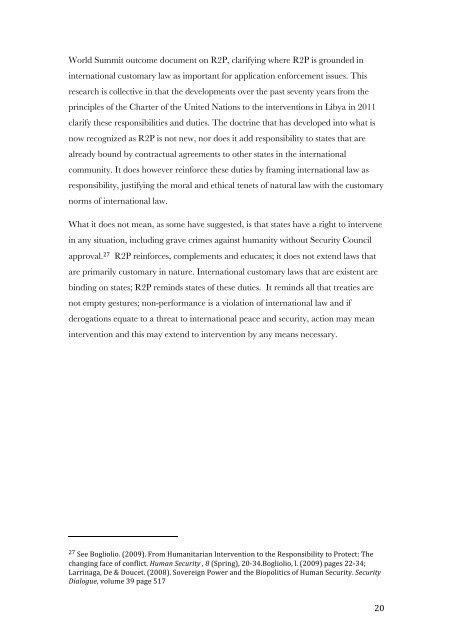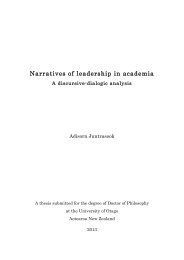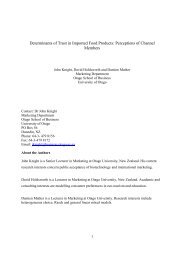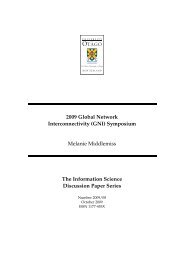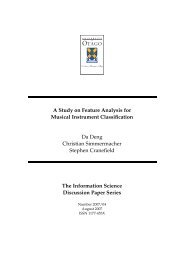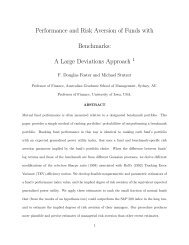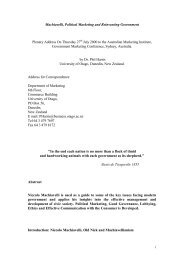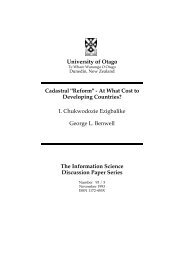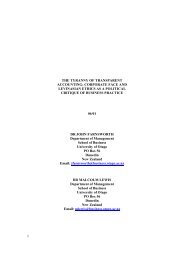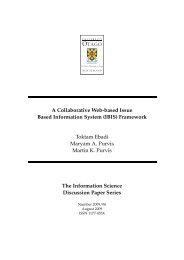Where is R2P grounded in international law? Anne-Marie Judson A ...
Where is R2P grounded in international law? Anne-Marie Judson A ...
Where is R2P grounded in international law? Anne-Marie Judson A ...
Create successful ePaper yourself
Turn your PDF publications into a flip-book with our unique Google optimized e-Paper software.
World Summit outcome document on <strong>R2P</strong>, clarify<strong>in</strong>g where <strong>R2P</strong> <strong>is</strong> <strong>grounded</strong> <strong>in</strong><br />
<strong>in</strong>ternational customary <strong>law</strong> as important for application enforcement <strong>is</strong>sues. Th<strong>is</strong><br />
research <strong>is</strong> collective <strong>in</strong> that the developments over the past seventy years from the<br />
pr<strong>in</strong>ciples of the Charter of the United Nations to the <strong>in</strong>terventions <strong>in</strong> Libya <strong>in</strong> 2011<br />
clarify these responsibilities and duties. The doctr<strong>in</strong>e that has developed <strong>in</strong>to what <strong>is</strong><br />
now recognized as <strong>R2P</strong> <strong>is</strong> not new, nor does it add responsibility to states that are<br />
already bound by contractual agreements to other states <strong>in</strong> the <strong>in</strong>ternational<br />
community. It does however re<strong>in</strong>force these duties by fram<strong>in</strong>g <strong>in</strong>ternational <strong>law</strong> as<br />
responsibility, justify<strong>in</strong>g the moral and ethical tenets of natural <strong>law</strong> with the customary<br />
norms of <strong>in</strong>ternational <strong>law</strong>.<br />
What it does not mean, as some have suggested, <strong>is</strong> that states have a right to <strong>in</strong>tervene<br />
<strong>in</strong> any situation, <strong>in</strong>clud<strong>in</strong>g grave crimes aga<strong>in</strong>st humanity without Security Council<br />
approval. 27 <strong>R2P</strong> re<strong>in</strong>forces, complements and educates; it does not extend <strong>law</strong>s that<br />
are primarily customary <strong>in</strong> nature. International customary <strong>law</strong>s that are ex<strong>is</strong>tent are<br />
b<strong>in</strong>d<strong>in</strong>g on states; <strong>R2P</strong> rem<strong>in</strong>ds states of these duties. It rem<strong>in</strong>ds all that treaties are<br />
not empty gestures; non-performance <strong>is</strong> a violation of <strong>in</strong>ternational <strong>law</strong> and if<br />
derogations equate to a threat to <strong>in</strong>ternational peace and security, action may mean<br />
<strong>in</strong>tervention and th<strong>is</strong> may extend to <strong>in</strong>tervention by any means necessary.<br />
27 See Bogliolio. (2009). From Humanitarian Intervention to the Responsibility to Protect: The <br />
chang<strong>in</strong>g face of conflict. Human Security , 8 (Spr<strong>in</strong>g), 20-‐34.Bogliolio, l. (2009) pages 22-‐34; <br />
Larr<strong>in</strong>aga, De & Doucet. (2008). Sovereign Power and the Biopolitics of Human Security. Security <br />
Dialogue, volume 39 page 517 <br />
<br />
20


